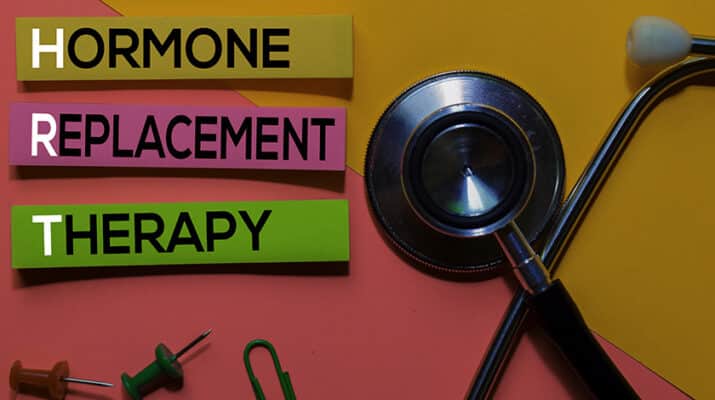As if night sweats, mood swings, mid-section weight gain, low libido and vaginal dryness weren’t bad enough, menopause can also raise the risk of cardiovascular disease, autoimmune disorders and osteoporosis
By Deborah Jeanne Sergeant
Ever since prescribing hormones for menopausal symptoms—known as hormone replacement therapy (HRT)—was correlated with increased risk of blood clots, stroke and cancer, fewer doctors have offered hormone replacement as an option.
However, Onondaga County Health Department Medical Director James Alexander, a physician, said that low-dose hormone replace therapy like hormone therapy in Cypress, TX is an example of one of the “much safer approaches to using hormone therapy. We’ve modified the medication and combinations and doses, all in the interest of maximizing relief and minimizing symptoms.”
He added that many primary care providers don’t recommend hormone replacement therapy because it’s not within their area of expertise. And many women don’t seek it because once they’re done having babies, they don’t see an OB-GYN anymore.
“A very effective way to mitigate many of those [menopausal] symptoms is to give women back estrogen and progesterone, whether in the form of a birth control pill for younger women to regulate the fluctuations, and in women who are over the traditional age of menopause, low dose hormone replacement therapy,” Alexander said. “Both are really quite effective in mitigating most of the symptoms of the menopausal transition.”
He also recommends vaginal medication to help with dryness, improve sleep and reduce hot flashes.
Instead of oral medication, patches and creams can provide relief that’s more targeted and doesn’t require the liver to filter it, thus reducing risk of blood clots.
Maintaining hormone levels isn’t only about pesky symptoms. James Woods, an, OB-GYN with University of Rochester Medical Center, said that balanced hormones can also help reduce inflammation and promote the body’s ability to support bone density. In younger women, the bones are in a constant state of building new cells and breaking down old cells. But an inflammatory response of the body disrupts that process, so the bones become softer.
Hot flashes are more than a nuisance. Woods said that they can indicate a higher cardiovascular risk. The hypothalamus in the brain signals the body to develop at puberty.
“Right next to that group of two neurons is the heat center,” Woods said. “When you’re younger, you didn’t realize you have half a degree that your body temperature could fluctuate and it would send a signal that you’re hot. You lose that half a degree and it sends a signal to the brain that you’re hot.”
The body sweats as a response to move that heated blood near the surface of the skin to cool.
“It’s a cardiovascular risk,” Woods said. “If it’s not treated and stopped, those women will be at more risk of cardiovascular damage and death. It’s not just an inconvenience.”
Weight gain also affects many women between 45 and 65. Woods said that the lack of estradiol causes inflammation of the lining of the intestines and upsets gut bacteria. In turn, the body’s metabolism slows down so that it stores more fat, increasing risk of cardiovascular disease, diabetes and more.
Depression and anxiety can also increase the risk of cardiovascular disease. These mental health struggles can stem from health issues, as well as what Woods calls the “chronic stress window” of caring for aging parents, working full time at the busiest part of her career, and bearing the majority of household chores and child rearing responsibilities.
“At that stage many women realize life didn’t work out,” Woods said. “Domestic violence, divorce and kids who could be in trouble add to the stress.”
Woods said that compared with women of the same age who lack these stressors, their immune system is different from those subjected to chronic stress.
He said that the best time to begin hormone replacement is around 48, as the levels begin to dip and before inflammatory damage begins.
Woods also counsels about other, non hormonal treatments that may help.

“The story about the risks of HRT have been confusing for both women and their medical providers over the last 20 years after the press around the Women’s Health Initiative study in the early 2000s leading to a generation of patients and clinicians terrified about HRT generally,” said Pebble Kranz, a physician, assistant professor of clinical family medicine and obstetrics and gynecology at University of Rochester and medical director of the Rochester Center for Sexual Wellness. “We now know that many of the findings from that study need to be evaluated in context and with more nuances.
“For most people younger than 65, HRT is not harmful and can be beneficial regarding heart, bone, sleep, mental, and sexual health. Meanwhile, the current guidelines are that HRT should be used for bothersome symptoms of menopause — hot flashes, sleep disruption, vaginal symptoms and others — not for prevention of health issues of aging. As with so much in medicine, the benefits and risks of HRT should be an individualized conversation with a qualified healthcare provider.”
She wishes more providers would seek more up-to-date information about menopause care from organization such as The Menopause Society.

